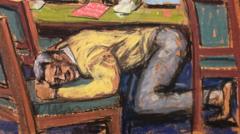Two prominent figures in the French antiques world, Georges "Bill" Pallot and Bruno Desnoues, have been sentenced to prison for their roles in a sophisticated fraud involving counterfeit chairs purported to have belonged to French royals like Marie Antoinette. The Pontoise court near Paris handed down a sentence of four months in prison along with longer suspended sentences after the duo faced accusations of selling these forgeries to prominent collectors, including the Palace of Versailles and members of the Qatari royal family.
Despite having served four months in pre-trial custody, both Pallot and Desnoues will not face additional jail time. The case, which garnered significant media attention, concluded a lengthy nine-year investigation into the fraudulent activities that have bled into the high-stakes world of antique furniture trade. In addition to the prison time, the court imposed substantial fines on Pallot and Desnoues, amounting to €200,000 and €100,000 respectively.
Following the verdict, Pallot expressed dismay over the financial penalties but was relieved that his residence would remain unaffected. Their accomplice, Laurent Kraemer, alongside his gallery, was acquitted of any negligence concerning the authenticity check of the sold chairs, as the judge recognized the gallery's claims of innocence.
The prosecution highlighted that Kraemer's gallery had no malicious intent and faced difficulties in identifying the forgeries, reassuring a relieved team of lawyers representing Kraemer. The fraudulent activities committed by Pallot, previously recognized as a leading expert in 18th Century furniture, involved clever manipulation, as he utilized his privileged access to Versailles' royal records to replicate missing chairs, which Desnoues expertly crafted.
During the trial, the prosecution underscored the critical implications of the case, exposing the veiled conflicts of interest within the historical furniture market, where experts simultaneously engage in the buying and selling of antiques. The sensational ruling highlights a pressing demand for tighter regulations within the art and antiques market to foster transparency and accountability, shedding light on malpractice pervasive in France's antiquities dealings.






















